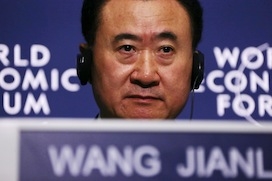(单词翻译:单击)

It was quite the wake-up for attendees at the WEF debate on Chinese-American-European cooperation. After a “well meant advice” of Harvard Professor Joseph Nye about Chinese policies in the South China sea, Wang Jianlin, China’s richest man, had had enough.
在世界经济论坛(WEF)举行的有关中国-美国-欧洲合作的辩论会上,出现了一个让与会者惊异的时刻。在哈佛大学(Harvard)教授约瑟夫•奈(Joseph Nye)就中国的南海政策提出一个“善意的建议”后,中国首富王健林忍不住在发言中表示反对。
“I’m not happy with the professor’s comments,” he said. “This is an economic debate. Not a political one. This is not polite.” In this initial and later reaction, he revealed a few interesting things about his strategy and temper – and made it seem as though influential Chinese are misunderstood by the outside world.
“我不满意教授的意见,”王健林说。“这是一场经济辩论,不应该扯到政治问题。这是不礼貌的。”他的这个初始反应和后续反应,让人对他的策略和脾气得到一些有意思的了解,并且显示,有影响力的中国人似乎被外界误解了。
First, a quick recap of the discussion.
首先,让我们快速回顾一下讨论的经过。
In giving his assessment of China as a rising economic power, former National Intelligence Council chairman Joseph Nye questioned China’s political influence. “Don’t assume that China is passing the US in overall power,” he said, “Particularly if you add in military power and soft power – which is to get what you want through coercion rather than head on collision.”
美国国家情报委员会(National Intelligence Council)前主席约瑟夫•奈在评估中国作为一个正在崛起的经济大国时,对中国的政治影响力提出质疑。“不要以为中国正在赶超美国的整体实力,”他说。“尤其是在你结合军事实力和软实力的情况下——也就是说,通过胁迫,而不是直接冲突,获得你想要的东西。”
He gave the example of China’s policy in the South China sea, where China’s military fleet intervented to keep Philippine fishers out of its international waters (which made the countries relations “go bananas”). “You have to balance hard and soft power,” he advised.
他以中国在南海的政策为例,在那里,中国军方的舰队在国际水域妨碍菲律宾渔民作业(此举使得两国关系“一团糟”)。“你必须在硬实力和软实力之间找到平衡,”他建议道。
The example added to an earlier comment the professor made on China’s conflict with Japan over three islands located between the two countries. “Let the conflict shiver for another generation,” Nye suggested. “Don’t put it on the stove.”
稍早前,这名教授还对中国与日本围绕两国之间三个岛屿的冲突发表评论。“让这个冲突再搁置一代人的时间吧,”奈建议道。“不要把它放在火上烤。”
But Wang Jianlin, the man behind Dalian Wanda and currently on a buying spree in the West, didn’t like the advice. He took his next speaking opportunity to criticize Nye in words atypical for Davos. “I am not happy about the professor’s comments about the Chinese fleet,” he said. “This is not the topic for today’s discussion.”
但是,大连万达集团创始人、目前正在西方大举收购的王健林不爱听这样的建议。他利用自己的下一个发言机会,用达沃斯较少听到的措辞来批评奈。“我不满意教授对中国舰队发表的意见,”他说。“这不是今天讨论的话题。”
Then, he switched gears, and said something which seemed like a warning of his own. “[I often get the question] whether we should invest in China or abroad [with Dalian Wanda],” he said.
然后,他转变话题,说了一些像是他自己在发出警告的话。“(我经常面对的问题是)大连万达应该在中国还是海外投资,”他说。
And he clarified: “To be frank, in China we would have a return on investment several times higher than the one we can get in the US or Europe. But we have a new target, to be a transnational company. That is why we go abroad.”
接着他澄清说:“坦率地说,在中国,我们能够达到的投资回报率比我们在美国或欧洲所能达到的高出数倍。但是,我们有一个新的目标,那就是成为一家跨国公司。这就是为什么我们走出国门。”
Lloyd Blankfein, the world’s most important financier, and Nick Clegg, both also present in the debate, acted as if the incident hadn’t happened.
出席这场辩论的世界上最重要的金融家——高盛(Goldman Sachs)首席执行官劳尔德•贝兰克梵(Lloyd Blankfein)和英国副首相尼克•克莱格(Nick Clegg)-——表现得就像根本没有发生这件事。
But it had. Here are three thoughts post-event:
但这件事确确实实发生了。以下是会后的三点想法:
1. Chinese business men like Wang may dislike outside meddling in their country’s “internal affairs” as much as their political leaders
1. 王健林这样的中国商人就像中国的政治领导人那样,不喜欢外界干涉他们国家的“内政”。
2. Wang Jianlin has more interest in building an empire than making the most money, according to what he said himself, undoubtedly adding fuel to those in Europe and the US that distrust him
2. 王健林对于建立一个帝国的兴趣超出最大化利润的兴趣,这是他自己表述的意思,这对欧美那些不信任他的人来说无疑像是火上浇油。
3. Even for Nye, formerly dean of the world’s most prestigious international relations school, the Kennedy School at Harvard, it’s sometimes impossible to stay out of a diplomatic incident.
3. 即便是曾经担任最负盛名的国际关系学府——哈佛大学肯尼迪学院院长的奈,有时也不可能回避一起外交事件。


